Meanwhile in Nigeria...
#EndSARS: Nigerian officials defend security forces as people protest police brutality
In a rush? No worries! The most important bits are in bold. Skim ahead!
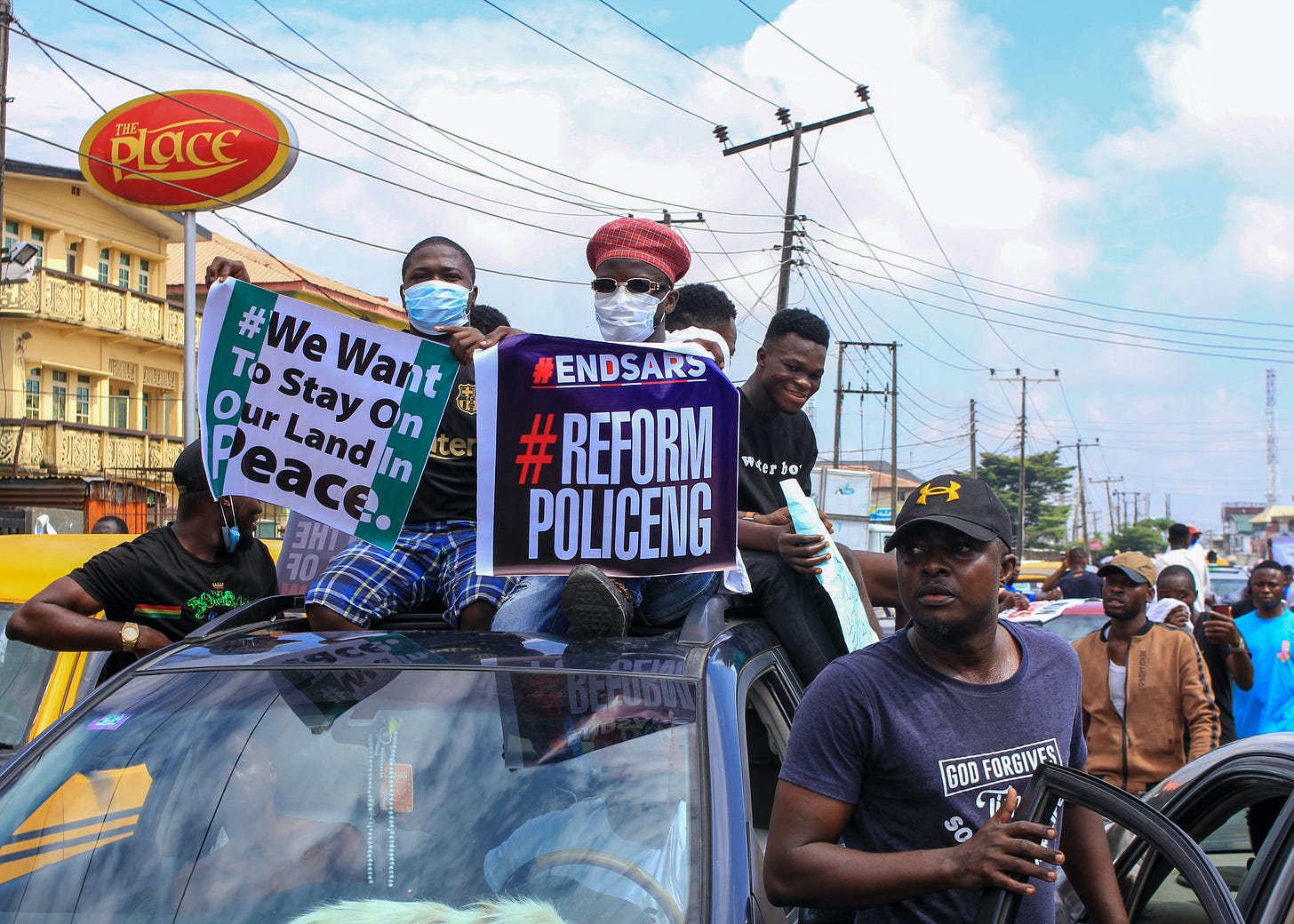
Photo by Tobi Oshinnaike on Unsplash
On Friday, Nigeria’s Inspector General of Police, Mohammed Adamu rejected Amnesty International’s report that the army shot and killed protesters at the Lekki toll gate demonstration. Concurring with President Muhammadu Buhari, in a series of tweets, the Nigerian Police Force claimed, “even when the protests turned violent in some parts of the country, the officers still maintained utmost restraint and did not use excessive force in managing the situations.”
Since protests began, at least 10 people have been killed, according to Amnesty International, as bursts of violence seeped into peaceful demonstrations. In Abuja, armed thugs attacked protesters and in Edo state, prisoners escaped from jail when a demonstration turned to chaos. Police officials claim people “posing” as protesters are looting weapons and torching police buildings. Director of Amnesty International Nigeria, Osai Ojigho, points to the police’s use of, “excessive force on peaceful protesters, leading to injuries and deaths.” Two weeks of protests combined with increasingly frequent clashes compelled the Governor of Lagos State, Babajide Sanwo-Olu to declare a 24-hour curfew on Oct. 20, tweeting, “arsonists, hoodlums and anarchists,” were “unleashing mayhem on the State.”
That evening, hundreds of people defied the curfew and descended on the Lekki toll gate intersection, a major protest site in an affluent part of Lagos state. The protesters, many of whom were draped in Nigeria’s green and white flag, staged a peaceful sit-in, as they sang and prayed while live-streaming the event on social media.
“We were sitting on the ground and singing the Nigerian national anthem and most of us had flags in our hands and we raised it up,” a witness who wished to remain anonymous, told the BBC.
At around 7 p.m the street lights went out. Throngs of security forces arrived and removed the area’s CCTV cameras, presumably, witnesses say, to limit video recordings. After barricading the area, soldiers began firing tear gas and shooting bullets into the crowd. Protesters fled, as the soldiers continued to shoot, killing at least 12 people. People rushed to help the wounded until ambulances arrived, but because of the barricade, witnesses said medical help was turned away.

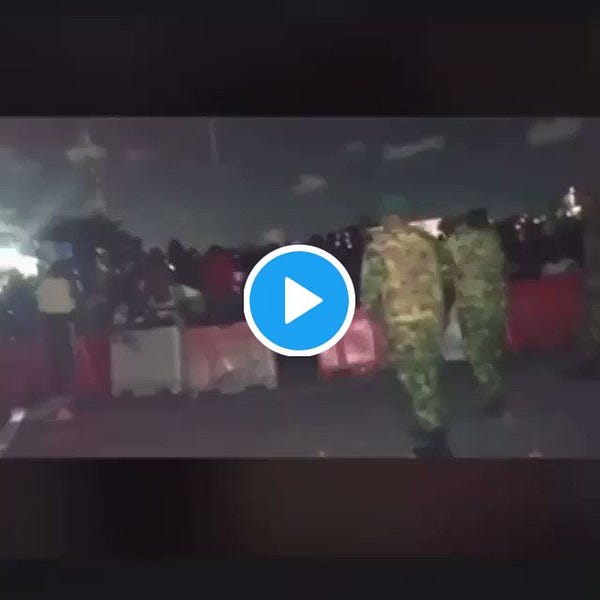
Powerful and disturbing images flooded social media as the peaceful demonstration turned bloody. One man continued singing the national anthem as bullets flew, his voice trembling.

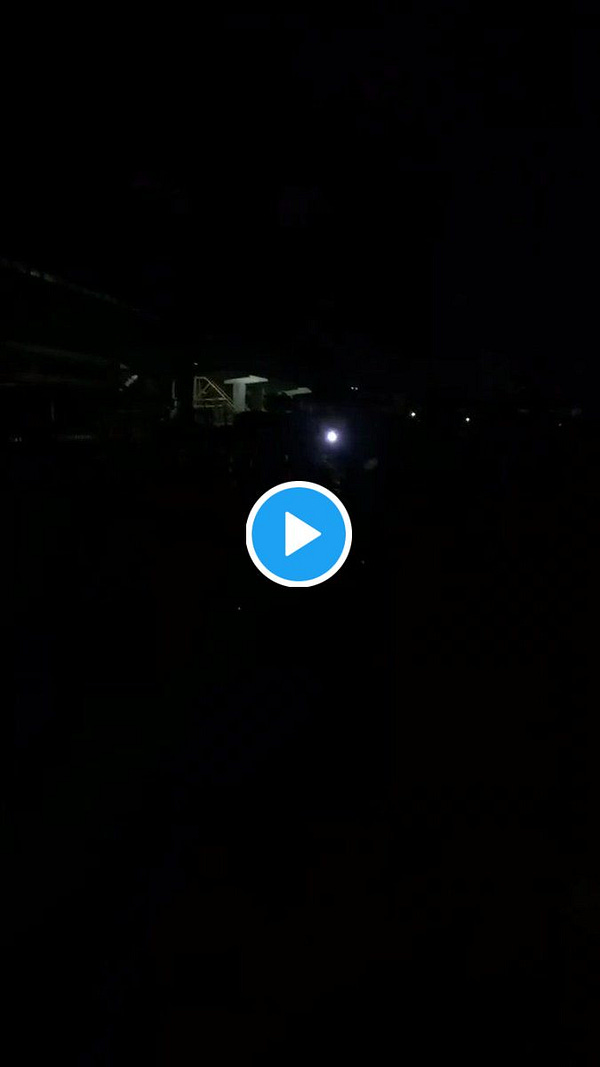
The Nigerian Army resisted accusations of what the Human Rights Watch calls a “shooting spree,” labeling reports about Lekki as “fake news.”
What is SARS
Established in 1984, the Special Anti-Robbery Squad was a unit of Nigeria’s police force, tasked with combating rising rates of armed robbery, kidnapping, and other serious crimes.
Its operations relied on anonymity, consisting of 15 people dressed in plain clothes, driving in ordinary buses with no weapons in sight. During the initial years, SARS did reduce crime rates. Over time, widespread abuse of power and impunity made the unit infamous for torture, arbitrary arrests, unlawful detention, extrajudicial killings, and extortion. Amnesty International reported 82 cases of torture, ill-treatment, and extrajudicial execution between January 2017 and May 2020. The report details that during raids, SARS officers target, “well-dressed young men, especially those in new cars.” Accused of being “internet fraudsters,” officers take these men into custody and demand they pay bribes. Those who cannot pay are usually tortured. Although Nigeria implemented anti-torture laws in 2017, Amnesty claims, “no SARS officer has been convicted of torture in a Nigerian court.”
How protests started
On Oct. 3, a video of SARS officers killing a man went viral. Nigerian authorities denounced the video, calling it fake and arrested the man who filmed it. Outrage led to nation-wide protests and an online movement, as people used the hashtag #endSARS to spread awareness and share their experiences. Since then, young Nigerians have fueled leaderless protests, calling on the government to dissolve the SARS force.
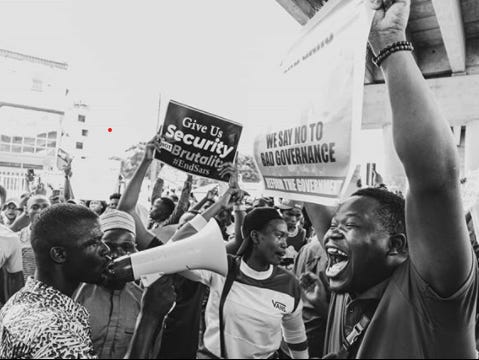
Protesters in Ekiti state. Image credit: Rachel Seidu on Instagram.
But the protests encapsulate more than police brutality. This is, “a result of years of people being undermined by the system,” explains political analyst and writer Gimba Kakanda. After years of, “bad governance, nepotism, and widespread corruption,” this is a chance for people to fight back. Kakanda was arrested by police forces during a protest. Although Nigerians have protested SARS for years, these demonstrations are the biggest in recent history.
The government’s response
On Oct. 11, police authorities declared the dissolution of the SARS force, and the creation of a judicial panel to investigate crimes committed by the officers. This is the fifth time such a declaration has been made since 2015. Mr. Adamu announced that the disbanded officers would undergo psychological and medical examinations before joining a new Special Weapons and Tactics force (SWAT) which would replace SARS. Activists immediately denounced SWAT and continued protesting, calling attention to five key demands.
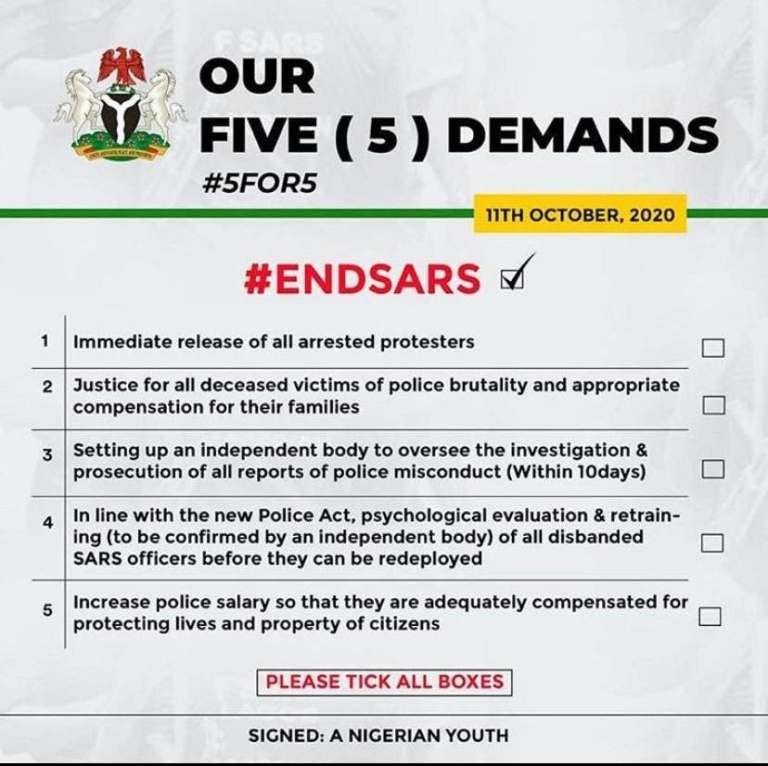
After the Lekki shooting, Governor Sanwo-Olu vowed to launch an investigation into the army’s actions.

President Buhari, who commands the army, reiterated that the government is listening to protesters and working on implementing several initiatives that go beyond police brutality. “I therefore call on our youths to discontinue the street protests and constructively engage government in finding solutions,” he tweeted, failing to mention what happened in Lekki.
Cracks in the cause
Although hundreds of people participated in the protests, some believe the movement should focus solely on police brutality, rather than greater structural change. Furthermore, northeastern Nigeria faces an Islamist insurgency led by Boko Haram, presenting profound issues for residents. Deutsche Welle reports, “people there are concerned that if SARS is dissolved, insecurity in the region will become even worse.” Demonstrations in Maiduguri, the birthplace of Boko Haram, are banned.
International reaction and the #BlackLivesMatter movement
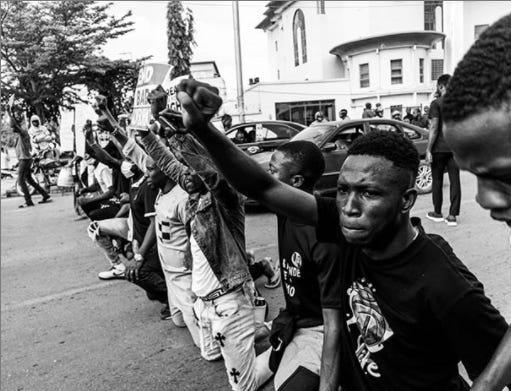
Protesters in Ekiti state. Image credit: Rachel Seidu on Instagram.
Nigerians have notably captured global attention on the matter through their savvy use of social media. The #endSARS hashtag, amplified by Nigerian personalities, gave the movement an international stage, with celebrities like Beyonce speaking out in support. Demonstrations have also been held in places like Toronto, London, and New York.
“We are united in this fight against police brutality, and against bad governance. All we want is good leadership and that is what is really touching, to see people come out and stand up for us, and we pray that tomorrow, while we are under some form of curfew where our internet is kind of slowing down, that people speak up for us,” said Damilola Odufuwa to VOA News after the Lekki protest. Odufuwa is a founding member of the Feminist Coalition, a Nigerian organization providing legal aid, funding, and supplies to protesters.
Nigeria’s protests come after the revolutionary #BlackLivesMatter protests against police brutality in the United States, following the murder of George Floyd. Nigeria and America’s movements share the belief that police forces cannot kill citizens and enjoy impunity in free, democratic countries. The Washington Post’s Karen Attiah writes in an op-ed that the #BlackLivesMatter movement not only exposed the issues in American police forces but possibly influenced others to use similar tactics. “In 2017, police officers from Prince William County in Virginia trained members of the Nigerian police in human rights. This is the same police department that recently used tear gas and rubber bullets against peaceful protesters.” The U.K. also admitted that they trained and provided equipment to SARS officers after originally denying the claim.
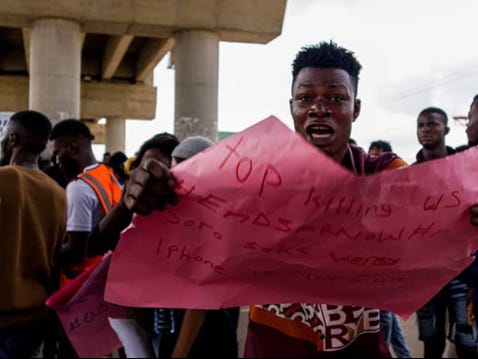
Protesters in Ekiti state. Image credit: Rachel Seidu on Instagram.
Nigeria is still waiting to see real progress from the dissolution of SARS. Ensuring the government is held accountable also means solidifying demands and sealing any cracks in the movement. The effect of international pressure is also yet to be seen as people launch petitions calling for sanctions and organizations like Amnesty International and the United Nations call for accountability. Nevertheless, the avalanche of protests has left an undeniable mark on Nigeria’s political landscape and how people interact with police forces from here on out.



